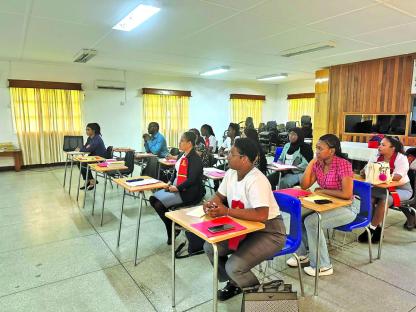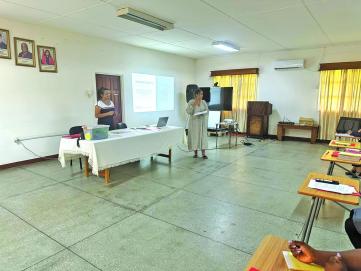
The Education Ministry is ramping up its training efforts for teachers to ensure that students with special education needs/disabilities (SEND) are provided with tailored support and inclusive education.
This was done in collaboration with the Amanah Academy to enhance teachers’ development.
On Monday the ministry said that the training sessions is being done throughout this week.
According to the ministry, this is part of their efforts to ensure that progress is made.
“The quality of life for learners with special education needs/disabilities (SEND) is a key focus,” the release stated, adding that the series of training sessions for teachers including particularly those completing the associate degree in disability studies.
The ministry added that the training covers a wide base which will certainly be beneficial for teachers.

“The training encompasses the theoretical aspect, complemented by a coaching component,” it said, pointing out that teachers will be engaged in understanding the scope of Functional Behaviour Assessment (FBA) and the role of the Behaviour Intervention Plan (BIP), making the connection to the concept of Applied Behaviour Analysis (ABA) as they execute the behaviour intervention plan.
ABA is a theoretical framework used to address challenging behaviours. This training dovetails with the focus areas (autism and intellectual abilities) in their just-completed coursework, giving them an even clearer understanding of how best to support learners with behavioural issues within the classroom. The premise of the training is that by reducing challenging behaviours, academic achievement will increase.
In 2022, the National SEND Coordinator Savvie Hopkinson had explained that during the Education Ministry’s Spotlight Programme that 706 teachers were trained across nine regions, including Regions One (Barima-Waini), Two (Pomeroon-Supenaam), Three (Essequibo Islands-West Demerara), Four (Demerara-Mahaica), Five (Mahaica-Berbice), Six (East Berbice-Corentyne), Seven (Cuyuni-Mazaruni), Nine (Upper Takutu-Upper Essequibo), Ten (Upper Demerara-Berbice), and Georgetown, in special education needs. These training sessions were targeted based on findings from officers during visits or from information provided by teachers.
According to the Coordinator, more children living with disabilities were being registered in in public school system due to increased sensitization and are even accessing learning in the mainstream setting, as opposed to specialised schools.
Discover more from Guyana Times
Subscribe to get the latest posts sent to your email.









